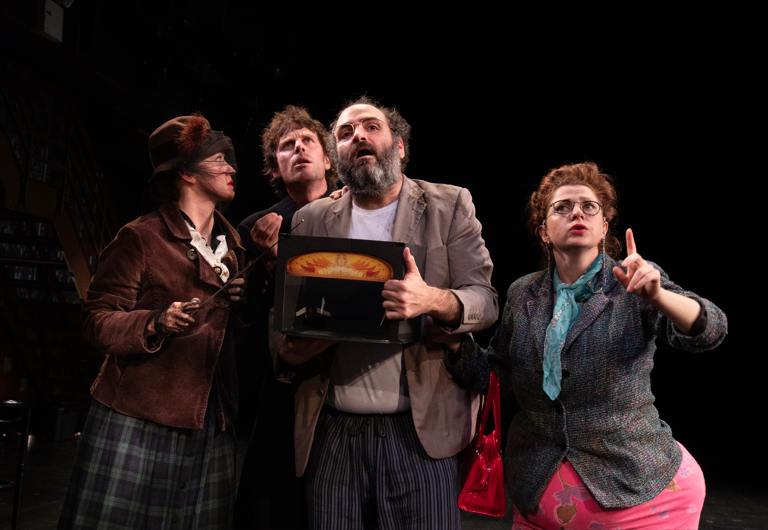Theater Review by Michael Dale . . . .
It all begins rather innocently enough.
Before entering BRIC for Krymov Lab NYC’s return mounting of author/director Dmitry Krymov’s Pushkin “Eugene Onegin” In Our Own Words, which adds healthy doses of charm and uneasiness to this year’s Under The Radar Festival, patrons are invited to bring a “child” with them to the theater and are offered to choose from an assortment of kid-sized puppets created by Leah Ogawa and Luna Gomberg.
I quickly made acquaintance with a tyke whose face was made from multi-colored electrical tape, had eyes fashioned from spoons, and sported a name tag stating, “Hello, my name is Margo.”
Margo and her sewn-together pals made effective icebreakers when I needed to get up to allow others into my row. We all introduced our theater companions to each other (though nobody seemed to get my All About Eve references) and there was a good deal of energetic cheeriness permeating the space as the house manager (actually, company member Natalie Battistone playing the house manager) escorted a quartet of actors playing a Russian theater troupe onto designer Emona Stoykova’s utilitarian playing space.

Dressed by designer Gomberg to resemble cartoon sketches of 100 years ago, they include a warm and bearded character man (Jeremy Radin), a comically padded, angularly statured character woman (Anya Zicer) and their younger counterparts, played by Elizabeth Stahlmann and Jackson Scott. Their accents are as playful as their fashions.
At first, the gang seemed a little confused with the Brooklyn environs (“Experimental theater? What kind of experiment? Like chemicals?”); even more so when the house manager tried to give the pre-show land acknowledgment speech recognizing the original habitants of the land we occupy (“What happened to them?”), but they soon settled themselves, seated puppet youngsters of their own up front, and began their presentation of a children’s theater dramatization of their countryman Alexander Puskin’s novel-told-in-verse, Eugene Onegin.
“Pushkin transformed Russian language,” explains Radin. “He make Russian language free.” In fact, the author is so revered by his people that, “in Russia we have Alexander Pushkin Airport. You have Walter Whitman Airport? I don’t think so.”
And then something happens. Something I won’t describe here, but it is a direct reference to the children of Ukraine, who are certainly not enjoying theater at the moment, and a condemnation of the troupe’s attempt to celebrate the literary culture of a nation whose government has been committing daily acts of inhumanity.
The founder of his own theater lab in Moscow, Krymov himself has been living in exile in New York after publicly criticizing Russia’s actions in Ukraine. His plays are now banned from being performed in his home country.


New Yorkers will remember that when the war first broke out, much was made of people boycotting Russian restaurants (despite their owners being escapees from tyranny) and bars dumping their Russian vodka. So with this cold interruption of the jovial proceedings, audience members are left to silently consider the children sitting on their laps and whether they can separate a nation’s culture from its government.
Though visibly shaken, the actors go on with the show, easing the audience back into a world of wonder where they take turns blowing on a feather to keep it afloat above them while explaining the features of Russian theater.
In short, Eugene Onegin concerns a wealthy party boy who has the nerve to have grown world-weary at age 26 (Even Noel Coward had the decency to wait until he was 27), messing up his love life and killing the nice guy poet who lives next door in a duel.
But our troupe is more concerned with the telling, rather than what’s being told, and their funny antics utilize familiar norms of children’s theater: the do-it-yourself production values, bits of audience participation, animal impersonations, and the recorded cries of a bored child complaining that she wants to go home. References to Meryl Streep and Mayor Eric Adams keep the grownups on their toes.
But there are also some darker moments that made me want to cover Margo’s spoony eyes, such as the matter-of-fact bluntness in presenting the death by duel. I was anxious about the mystery contents of a package rejected from the Museum of Morbid Anatomy and, in the show’s most complex demonstration of life’s futility, a pair of mechanical contraptions help demonstrate how carefree nature is in continually revolving and replenishing from season to season, while Onegin, represented by a stuffed Kermit The Frog, shows how people have no choice but to move forward, and that looking back can only remind you of the sadness of knowing what you will never have again.
And while the silliness of the show is fun, the richness comes from the company’s sincerity in believing they can convey the adult lessons of Pushkin’s novel in a manner that can be appreciated by an audience of children.
Which made me wonder if perhaps children’s theater is just a bit edgier in Russia than it is in the US. After all, this is the country that calls Chekhov’s plays comedies.
Pushkin Eugene Onegin: In Our Own Words. Through January 28 at BRIC (647 Fulton Street, Downtown Brooklyn). Ninety minutes, no intermission. www.bricartsmedia.org
Photos: Bronwen Sharp


















